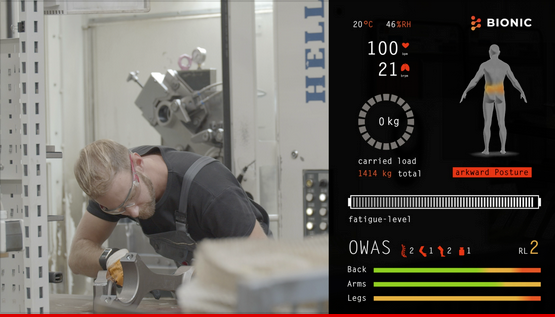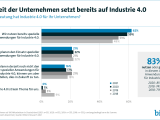
DFKI at HANNOVER MESSE 2021
12. April 2021DFKI at HANNOVER MESSE 2021
Saarbrücken, 12.4.2021
The leading theme of Hannover Messe 2021 is „Industrial Transformation“. The German Institute for Artificial Intelligence (DFKI) has been conducting research in this area for 10 years now. Together with their project partners, they present application-oriented research on the central AI research fields of Deep Learning, Robotics, Sensor Technology, Human-Robot Collaboration, Language Technology, Education Technology, GreenTech, Smart Services in Industrial and Business Processes, Gaia-X, Explainability and Trustworthiness of AI Systems.
A selection of the exhibits :
AdEPT – Augmented reality and AI-based learning, teaching and collaboration tool for corporate education and training.
The AdEPT project is creating an augmented reality-based learning and teaching tool for in-company education and training. Included is an AI-based peer tutoring functionality that can dynamically and context-sensitively initiate learning partnerships between students in training workshops or classrooms.
BIONIC – Intelligent sensor networks reduce physical stress in the workplace
Sensors worn on the body collect data on heart and breathing rates or posture. Playful applications and a training app motivate people to counteract one-sided stress and provide personalized and medical assistance for training at home.
CoMem – AI to assist daily work in the company.
The corporate memory CoMem taps into the potential inherent in corporate data using AI methods and embeds it in employees‘ work environments. The knowledge that can be mobilized in CoMem is made up of data on tasks and processes, experiences made and decisions made, among other things. Knowledge services are realized on this data treasure and integrated into the workplace as knowledge-based assistance. Embedded in the daily work, CoMem enables intelligent searching or gives recommendations on upcoming tasks.
DFKI4planet – AI for Environment and Sustainability
Sustainable AI key technologies help to develop and advance solutions for global challenges such as climate protection, energy transition and resource conservation. In order to map the potential of DFKI in this field, the competence center „Artificial Intelligence for Environment and Sustainability“, in short „DFKI4planet“, was established. This pools the expert knowledge of the various research areas in order to jointly develop ideas and concepts for the responsible and sustainable use of AI. In addition, it serves as a contact point for interested scientists, environmental organizations and companies as well as for the exchange with politics, authorities and the public.
InGewA – The integrated business tax assistant
DFKI and DeepReader GmbH, together with the energy service provider enviaM, have developed a generic application on their technology platform for the intelligent processing of trade tax notices. The integrated trade tax assistant „InGewA“ is characterized by high performance and process integration. Depending on the company’s strategy, InGewA can be installed in its own environment or operated in the cloud. Generic integration into company-specific processes can be realized via standard interfaces.
Innovative Retail Laboratory (IRL) – application-oriented research for the retail of the future
The Innovative Retail Laboratory (IRL) of the German Research Center for Artificial Intelligence (DFKI) has been providing a visionary view of the retail trade of the future since 2007. Only by linking information from different data sources and interpreting it semantically can knowledge be generated from information. The development of corresponding, intelligent assistance systems for customers and retail employees is the core vision of the IRL.
KI-Campus – The Learning Platform for Artificial Intelligence
The digital learning platform addresses students of different disciplines, professionals and other lifelong learners. The goals are to counter the acute shortage of skilled workers and to promote a mature approach to AI in civil society.
Robotics Innovation Center – Intelligent robotics – for land, water, space and humans.
The DFKI research area Robotics Innovation Center (RIC) combines AI methods with state-of-the-art robotics and researches mobile systems for a wide range of applications: Rovers for exploring foreign planets and autonomous underwater vehicles for shallow to deep waters are part of the RIC’s repertoire, as are robots on wheels or on two to six legs that explore the earth’s surface, support humans in production and maintenance, or are used in dangerous situations. Also, with the help of exoskeletons for physical rehabilitation, smart electromobility, and safe human-machine interaction, RIC is working to make AI and robotics applicable to humans.
Smart Construction – Artificial Intelligence in Construction.
The project developed a web platform based on Industry 4.0 technologies that enables digital information exchange between all parties involved in construction and realizes intelligent planning and control services as well as continuous quality assurance and documentation processes. It will be shown how automatic condition recording, remote management and predictive maintenance can be realized on the construction site. Intelligent and networked sensors in construction materials, in the construction site environment or on machines support the AI technologies used.
TexaS – construction kit for multifunctional textile-adapted electronic systems
Prerequisites for the successful and reliable integration of existing and future electronic systems in textiles are contacting and power supply solutions. The main objective of the project is to advance the research field of electronic textiles and thus microsystems technology in the textile sector in line with Industry 4.0. The goals are increased functionality, energy and resource efficiency through cost-effective processes and use of alternative materials and long-term stability. Worked on: – Hybrid integration of different substrate materials and functionalities – Multifunctional and active interposers, alternative materials for interposers – Embedding and contacting with advancing miniaturization – Functional and application-oriented packaging.
TRACTAT, CAMELOT, RICAIP – Transfer of control in distributed Industry 4.0 applications.
Autonomous robots can adapt their behavior to the current context of action. If they get into a situation where they need help, e.g. by a human, a transfer of control can be initiated. The robot gives up autonomy and transfers control to a human until the human has rectified the situation. A transport robot notifies a human in a situation that cannot be resolved by itself and provides the human with as comprehensive an overview as possible. With the help of other technical options for analysis, e.g. the bird’s-eye view of a camera drone, the human rectifies the problem by taking control and safely controlling the robot remotely from any location.
In the opposite case, a human may want to temporarily hand over part of his or her workflow to a robot to prevent a complete production shutdown. The robot may not be able to work as fast as the human. In a robot teach-in based on a multimodal dialog system, a human gives a robot a new job using speech and gestures. The robot proactively asks the human for missing parameters and then begins its work.
XAINES – Explaining AI with Narratives
The goal in the XAINES project is to ensure AI explainability and to generate explanations (narratives). The researchers are investigating the central question of whether the AI can justify in one sentence why it acted the way it did or whether it has to explain it interactively to the user. One project focus is exploring narrative and interactive narratives, which are particularly useful when using AI systems to facilitate the assimilation of complex facts. To generate explanatory narratives, (speech-)labeled sensor data streams and predictive models are used. Sensor information is combined with speech information, from which the AI system develops an understanding of the scene, whereby explanations can then be generated.
The full overview can be found here:
https://www.dfki.de/web/news/detail/News/dfki-auf-der-hannover-messe-2021-digital-edition


